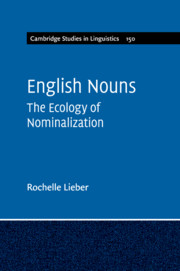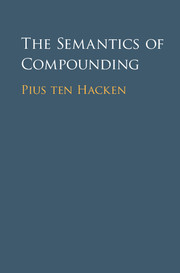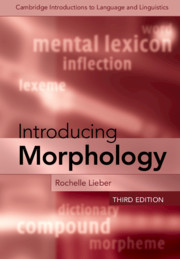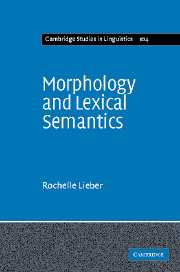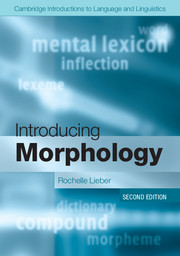English Nouns
Using extensive data from the Corpus of Contemporary American English (Davies, 2008), this groundbreaking book shows that the syntactic patterns in which English nominalizations can be found and the range of possible readings they can express are very different from what has been claimed in past theoretical treatments, and therefore that previous treatments cannot be correct. Lieber argues that the relationship between form and meaning in the nominalization processes of English is virtually never one-to-one, but rather forms a complex web that can be likened to a derivational ecosystem. Using the Lexical Semantic Framework (LSF), she develops an analysis that captures the interrelatedness and context dependence of nominal readings, and suggests that the key to the behavior of nominalizations is that their underlying semantic representations are underspecified in specific ways and that their ultimate interpretation must be fixed in context using processes available within the LSF.
- Provides an extensive discussion of the majority of nominalizing processes in English, including affixation and compounding
- Uses extensive data from the Corpus of Contemporary American English (Davies, 2008) as a basis for assessing claims that have been made in previous analyses of nominalizations
- Provides a comprehensive analysis of the full range of nominalization data within Lieber's Lexical Semantic Framework (2004)
Product details
July 2018Paperback
9781316613870
207 pages
230 × 153 × 10 mm
0.32kg
Available
Table of Contents
- Part I. Preliminaries:
- 1. Introduction
- 2. Terminology and methodology:
- 2.1 Terminology
- 2.2 Methodology
- Part II. Data:
- 3. Event/result nominalizations:
- 3.1 Previous claims
- 3.2 Nineteen questions
- 3.3 Adding it all up
- 4. Nominalizations as a derivational ecosystem:
- 4.1 The derivational ecosystem
- 4.2 Forms and readings
- 4.3 Inanimate patient nouns
- 4.4 Conclusion
- Part III. Nominalization within the LSF:
- 5. A lexical semantic approach to nominalization: the basics:
- 5.1 Recap of the LSF
- 5.2 E versus R skeletons: a first pass
- 6. The eventive reading:
- 6.1 ATK nominalizations with the eventive reading
- 6.2 -ing nominalizations
- 6.3 Conversion nouns
- 6.4 A note on simplex nouns
- 6.5 Conclusion
- 7. Referential readings:
- 7.1 Basic skeletons
- 7.2 Referential readings for ATK, -ing, and conversion Ns
- 7.3 Personal and participant nominalizations
- 7.4 Abstract nominalizations
- 7.5 Collectives
- 7.6 Underpopulated habitats
- 7.7 Modal and evaluative elements of affixal meaning
- 7.8 Conclusion
- 8. Nominalizations and compounding in the LSF:
- 8.1 Claims
- 8.2 The corpus data
- 8.3 The LSF analysis
- 8.4 Conclusions and loose ends
- 9. Nouns in the wild.

